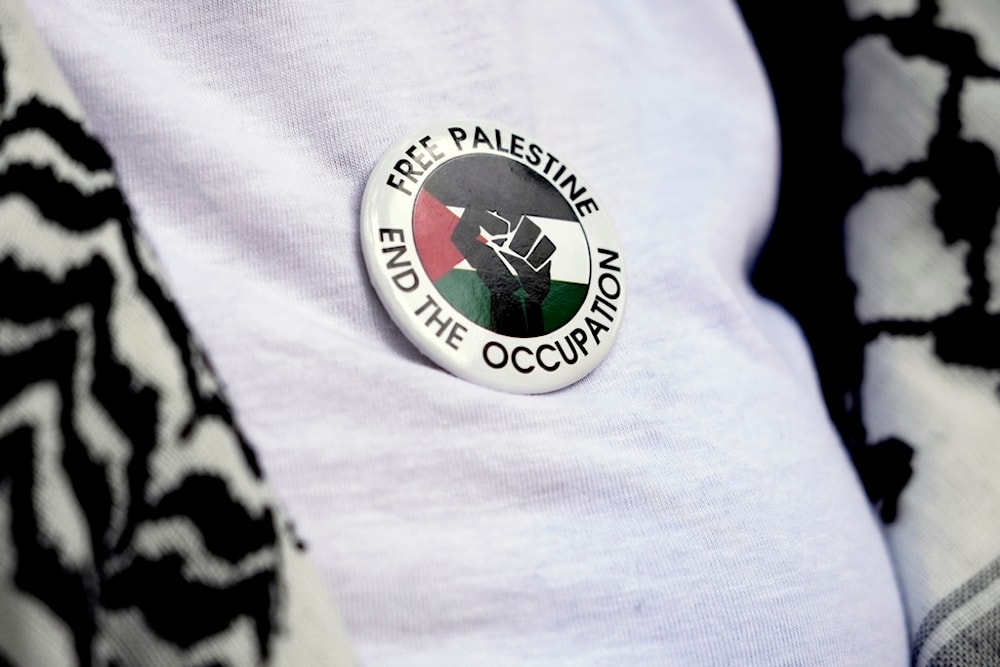Majority of pro-Palestine student protests peaceful, NGO survey finds
Acled documented over 70 cases of forceful police intervention against campus protests, including the use of chemical agents and physical dispersal tactics.
-

A protester wears a Pro-Palestinian pin protesting the war on Gaza, during an hour-long silent protest on the University of Southern Mississippi campus, Tuesday, May 7, 2024, in Hattiesburg, Miss (AP)
Data from the Armed Conflict Location and Event Data Project (Acled) reveal that 97% of pro-Palestine campus protests since mid-April have maintained nonviolent expressions of dissent.
An extensive analysis of 553 campus demonstrations conducted nationwide between April 18 and May 3 further corroborated this finding, with less than 20 instances resulting in any serious interpersonal violence or property damage.
During this same period, Acled documented over 70 cases of forceful police intervention against these campus protests, including the use of chemical agents and physical dispersal tactics.
While nearly half of the categorized violent campus protests involved confrontations with law enforcement, the demonstrations themselves have varied widely in scope and purpose.
Student-led protests are surging: #ACLED data shows a near tripling in pro-#Palestine demonstrations across the #US this April, particularly in NY & CA.
— Armed Conflict Location & Event Data Project (@ACLEDINFO) May 7, 2024
Are these protests influencing public opinion on the #Israel-Palestine conflict? Get the data. ⤵️https://t.co/bUBqoJWxnb
Encampments in solidarity with Gaza have sprouted across college campuses since April, with students articulating demands such as public university support for a Gaza ceasefire, divestment from Israeli companies, and the severance of ties with Israeli academic institutions.
Administrators' responses to these protests have varied. Some schools like Columbia University have resorted to calling in law enforcement to forcibly dismantle encampments, resulting in over 2,600 arrests across 50 campuses, as reported by the Associated Press.
University leaders have cited 'disruptions to campus life and concerns over student safety as reasons for these actions', echoing sentiments expressed by US President Joe Biden, who criticized violent tactics during protests.
Read more: Rashida Tlaib joins GWU students after police cleared encampment
Acled's definition of peaceful protests excludes those involving serious physical violence or property damage. By this standard, the majority of recent campus protests have remained peaceful, despite a small percentage being categorized as violent.
The few violent incidents have drawn attention, notably the late-night attack at the University of California, Los Angeles (UCLA), where masked Zionists assaulted students and attempted to dismantle a Gaza solidarity encampment.
But beyond physical violence, much of the public discourse surrounding these protests has centered on the rhetoric employed by demonstrators.
Criticism has been directed towards debates over the line between criticism of the Israeli regime and its alleged ties to antisemitism, as well as concerns over the impact of protests on the safety of Jewish students which have so far proven to be misleading.
It's important to note that Jewish students play a significant role in the protests, advocating for a ceasefire and distancing themselves from Zionism, which they view as a fascist and racist ideology.
Other debates have also arisen over the response of law enforcement to campus protests, with questions raised about the appropriateness of forceful interventions.
Read more: USC students clear Gaza encampment after police, uni. threaten arrest

 3 Min Read
3 Min Read










